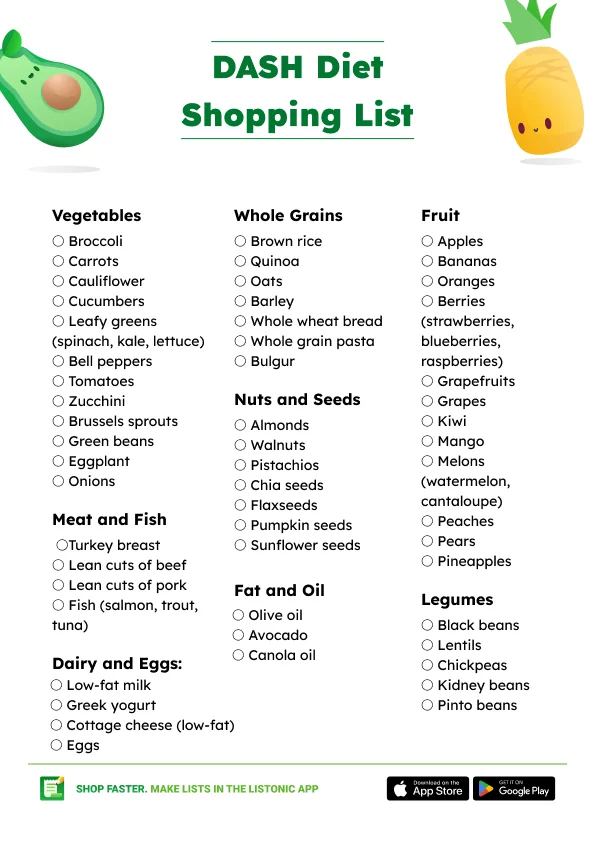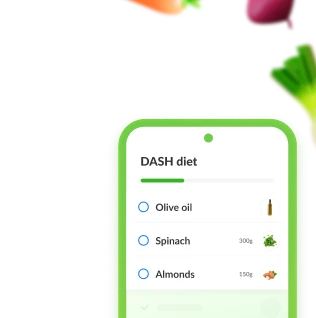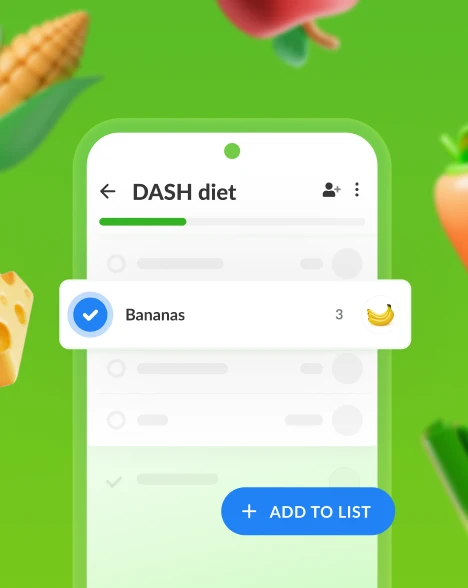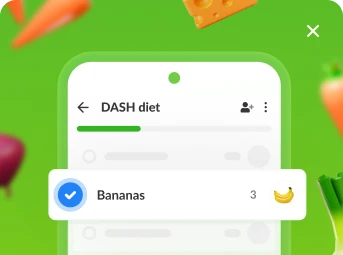Privacy Policy | Terms of services | Consent choices | © 2006-2024 Listonic. All rights reserved. Listonic Dev, and Listonic Ads are part of Listonic.

DASH Diet Food List (+ Shopping List and PDF)
January 22, 2025
The DASH diet helps to lower blood pressure and keeps your heart healthy. It’s a balanced and nourishing eating approach recommended by the U.S. National Institutes of Health (NIH). If you want to boost your heart health and take care of your entire cardiovascular system in 2025, we’ve prepared a handy shopping list and a downloadable PDF to make your journey to a healthier lifestyle easier.
Table of contents
The DASH Diet Shopping List
DASH Diet Guidelines
DASH Diet Food List Breakdown
What Else to Keep in Mind?
Conclusions
The DASH Diet Shopping List
Fruits
Vegetables
Whole Grains
Legumes
Nuts and Seeds
Meat and Fish
Dairy and Eggs
Fats and Oils
DASH Diet Guidelines
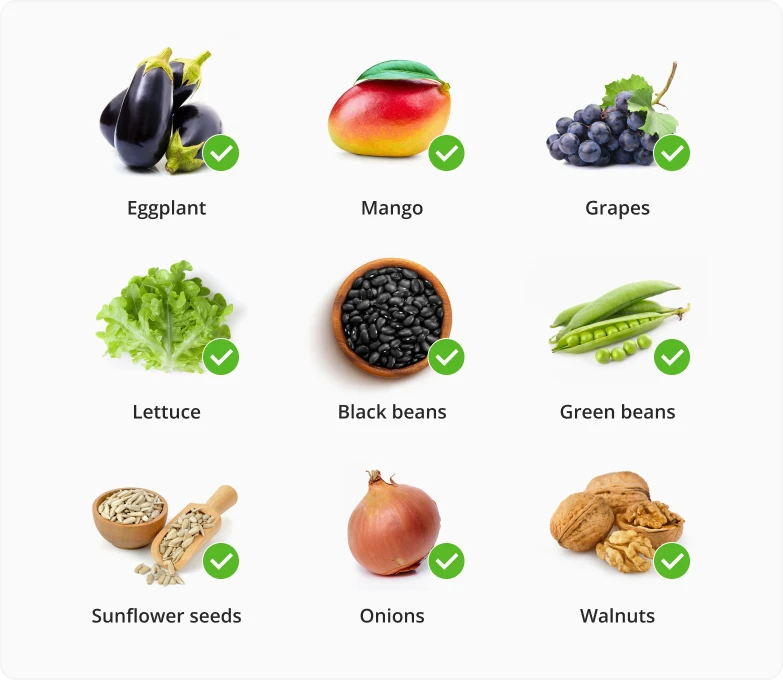
In short, the DASH diet emphasizes nutrient-rich foods and limits the intake of sodium, saturated fats, and added sugars. You should try to include a variety of colourful fruits and vegetables in your meals. These are packed with essential vitamins, minerals, and antioxidants. Eat at least 4-5 servings of fruits and 4-5 servings of vegetables per day.
Also, choose whole grains over refined grains. Whole grains are higher in fiber and nutrients so they help maintain healthy blood pressure levels. When it comes to protein, choose lean sources that provide essential amino acids and are low in fat.
Don’t forget that excess sodium can raise blood pressure levels, so you should limit the amount of salt you consume. Instead, opt for herbs, spices, and natural flavorings to season your meals and use smaller plates and bowls to control portion sizes and listen to your body’s hunger and fullness cues to avoid overeating.
Finally, stay hydrated to support healthy blood pressure. Drink at least 8 glasses of water throughout the day.
DASH Diet Food List Breakdown
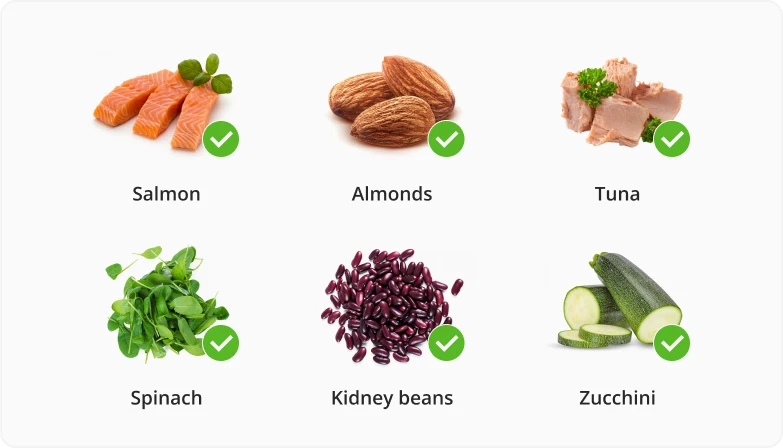
Fruits
Rich in essential vitamins, minerals, and dietary fiber, fruits are a staple of any balanced diet. They are low in sodium and rich in potassium, which helps to maintain steady blood pressure. Additionally, they offer natural sweetness, so they can satisfy your sweet tooth.
Whole Grains
Foods like brown rice, quinoa, oats, and whole wheat bread contain complex carbohydrates, fiber, and essential nutrients. Whole grains provide sustained energy and keep you full for longer after a meal – it prevents overeating and blood sugar spikes.
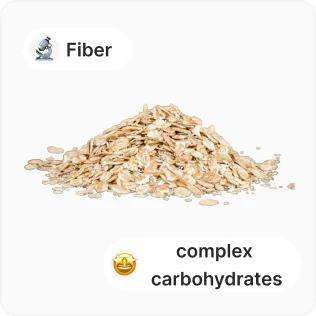
Vegetables
Vegetables play a central role because of their high nutrient content and low calorie density. They’re packed with vitamins, minerals, and dietary fiber while being naturally low in sodium and fat. Vegetables, especially leafy greens, are excellent sources of potassium, which supports heart health.
Legumes
Pulses, such as beans, lentils, and chickpeas, are low in fat and packed with nutrients – mainly plant-based protein and fibre. They promote heart health by reducing cholesterol levels, stabilizing blood sugar, and supporting healthy blood pressure.
Nuts and Seeds
These nutrient-dense foods contain a range of healthy fats, protein, fiber, vitamins, and minerals. They promote satiety and maintain stable blood sugar levels. Although calorific, they can be part of a balanced diet, offering satisfying crunch and high nutritional value.
Meat and Fish
The DASH diet encourages lean sources of protein, such as skinless poultry, lean cuts of beef, and fish. These options are lower in saturated fat and cholesterol compared to fattier kinds of meat. They support your muscles and other body tissues, making you stronger and injury-resistant.
Dairy and Eggs
Low-fat dairy products, such as milk, yogurt, and cottage cheese, should be included for their calcium, protein, and vitamin D content. They contribute to bone health and can be part of the DASH diet when chosen in their low-fat versions. Eggs provide high-quality protein and vitamins, making them a versatile option.
Fats and Oils
Choose healthy fat sources, such as olive oil, avocado, and canola oil. They are rich in monounsaturated and polyunsaturated fats, which can help reduce LDL (bad) cholesterol levels and support heart health. The key, however, is moderation – you don’t want to eat too much fat.
Get a DASH Diet Grocery List on Your Phone!
Add & remove items
Sort items by store aisles
Share the list with your partner
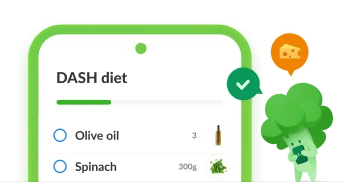
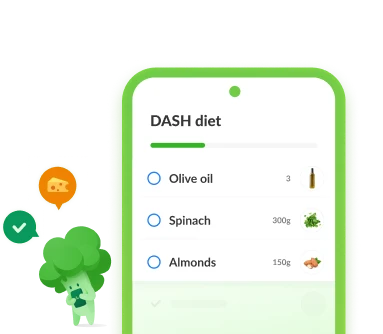
What Else to Keep in Mind?
What Foods to Avoid?
When on the DASH diet, you should limit certain foods that can negatively impact blood pressure and heart health.
High-Sodium Foods: Excessive sodium consumption can increase blood pressure. Avoid processed foods, canned soups, sauces, and condiments, which often contain lots of sodium. Read food labels and choose no-salt-added options whenever possible.
Added Sugars: Cut down on foods and beverages that contain added sugars, such as sugary drinks, candies, pastries, and desserts. Opt for natural sources of sweetness like fruits.
Saturated and Trans Fats: They can contribute to heart disease and high cholesterol levels. Try to reduce your consumption of fatty meats, full-fat dairy products, fried foods, and commercially baked goods.
High-Fat Dairy: While low-fat dairy products are recommended on the DASH diet, you should limit high-fat dairy (e.g. whole milk, full-fat cheese, and cream).
Processed Meats: Avoid processed meats such as bacon, sausage, hot dogs, and deli meats. These products are often high in sodium and artificial additives.
Excessive Alcohol: Alcohol consumption can raise blood pressure and have detrimental effects on your heart. If you choose to drink, do so in moderation. This means up to one drink per day for women and up to two drinks per day for men.
Who Should Follow the DASH Diet?
The DASH (Dietary Approaches to Stop Hypertension) diet was initially developed to help patients lower their blood pressure, but it is now recognized as a healthy eating plan for overall heart health and well-being in 2025. This diet can be beneficial for:
People with Hypertension: The DASH diet is particularly recommended for people with high blood pressure. It is also suitable for those at risk of this condition - the DASH diet prevents the development of hypertension.
Patients with Heart Diseases: The diet's emphasis on fruits, vegetables, whole grains, lean proteins, and healthy fats makes it suitable for people with cardiovascular diseases or those who want to improve their heart health.
People aiming for a Nourishing Diet: It is a well-rounded and balanced diet that emphasises the consumption of nutrient-dense whole foods, so it’s a beneficial eating pattern for everyone wanting to take care of their health.
Conclusions
Now that you have a thorough understanding of the DASH diet, you can try it out for yourself. Take care of your heart and overall health by using our helpful 2025 shopping list. You have the option to download a PDF version or open the list in our convenient Listonic app, which is completely free. The app allows you to customize the list according to your specific needs.
